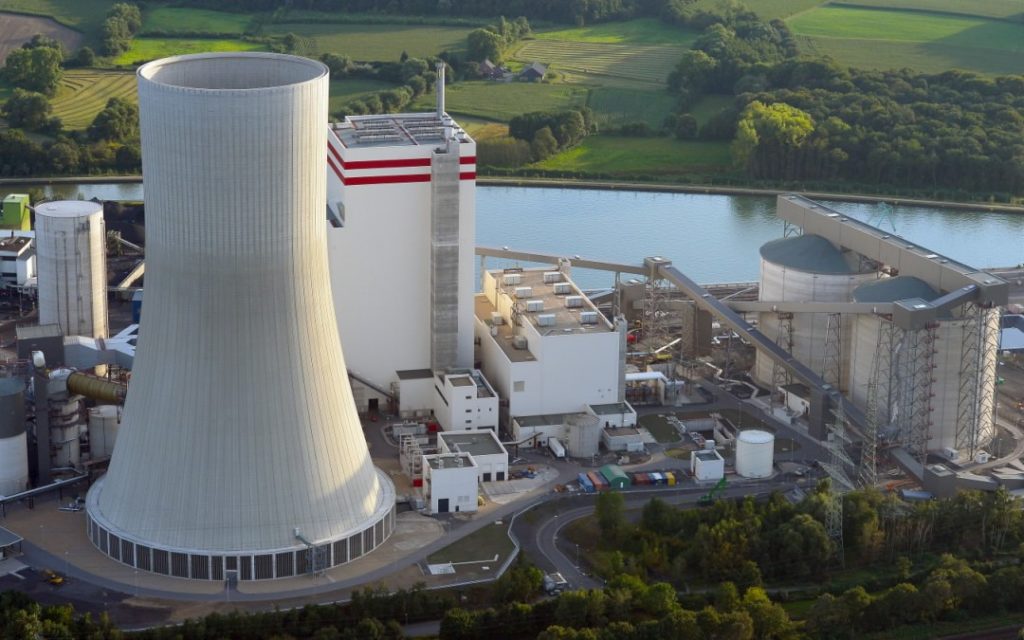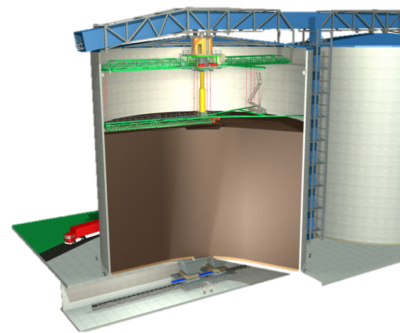Large storage capacity Saving valuable space Environmentally safe Highly automated
Le stockage conventionnel de stocks ouverts nécessite un espace précieux, impliquant des inconvénients environnementaux et une perte de valeur calorifique. Le stockage en silo fermé résout ces problèmes avec l’empreinte la plus petite possible. Le système Eurosilo offre un stockage en toute sécurité jusqu’à 100 000 m³ par unité. Le charbon est introduit par le haut dans une goulotte à travers laquelle il atteint le cadre de distribution sur la surface du charbon. Le répartiteur répartit le matériau uniformément sur toute la surface. La récupération se fait en extrayant le charbon des trémies et en déclenchant un écoulement central. Le cadre de distribution alimente le charbon dans l’écoulement central formé.
Étude de cas Centrale électrique de Trianel à Lünen
La centrale au charbon de Trianel à Lünen est avec une puissance de 750 MW, la centrale au charbon la plus efficace et la plus propre d’Europe. Le charbon est déchargé par des grues à l’usine et stocké sans poussière dans les deux Eurosilos qui offrent une capacité totale de 200 000 tonnes, assez pour faire fonctionner l’usine pendant environ 30 jours à plein régime. Les émissions de poussières sont pratiquement éliminées en utilisant des systèmes de convoyage entièrement fermés. En savoir plus sur la performance environnementale primée.

La gestion du carburant maximise les revenus
Votre centrale thermique atteindra le taux d’efficacité le plus élevé en brûlant le mélange de charbon optimal. Pour préparer les bons mélanges, le système de gestion de carburant ESI est d’une grande aide. Le logiciel visualise les différentes qualités de charbon dans les silos respectifs et permet à l’opérateur de planifier le mélange de charbon de manière optimale. Les spécifications de la chaudière, les caractéristiques du charbon et les niveaux de stockage mesurés fournissent des données d’entrée pour le système de gestion du carburant. La récupération de différentes qualités de charbon de différents silos à une vitesse contrôlée vous donne le mélange de charbon optimal. Des économies de coûts importantes, dues à une maintenance minimale et à un traitement entièrement automatisé, se traduisent par une courte période d’amortissement.
Évaluation du cycle de vie avec EMA
Pour garantir un retour sur investissement à long terme, il est essentiel de parvenir à une conformité rentable avec les réglementations et politiques environnementales. La comptabilité de gestion environnementale (Environmental Management Accouting, EMA) intègre les données environnementales, opérationnelles et de maintenance dans une analyse financière. L’évaluation du cycle de vie, reconnue par la Communauté européenne, offre une évaluation complète.

- Une empreinte minimale pour le stockage à grande échelle
- Une méthode de stockage la plus sûre du marché
- Pas de pollution ni de perte de valeur calorifique
- Un contrôle logistique et une flexibilité maximum
- Des coûts d’exploitation et de maintenance minimes
- Un haut niveau de disponibilité grâce à un temps d’arrêt minimal
Contact us